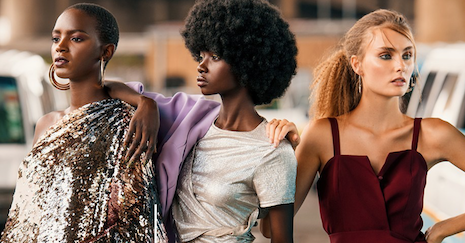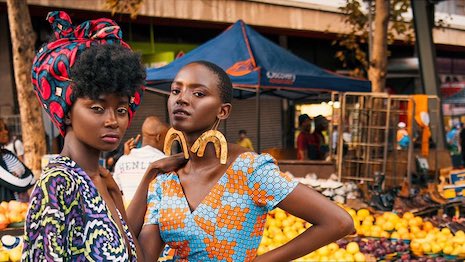CAPE TOWN, South Africa – Although many high-end fashion brands take inspiration from African cultures, designers native to the continent still lack visibility.
In a conversation between Vogue International editor Suzy Menkes and the founder of African Fashion International at the Condé Nast International Luxury Conference on April 10, the two women discussed the potential of the African fashion industry. Urbanization and globalization are also shaping Africa into a valuable market in the fashion business.
“I’ve always had a love for my people in South Africa, a love for African people, a love of the creativity I have seen growing up,” said Dr. Precious Moloi-Motsepe, founder and executive chairperson at African Fashion International. “It was very important to set up AFI because I saw an opportunity for us to create a platform that could not only help designers, to empower them, to market their clothes, but also to support them in terms of knowledge and education.”
Made in Africa
AFI focuses on the business rather than aesthetic aspect of fashion. Networking, collaboration and mentorship are also part of the organization's educational philosophy.
“Our role is marketing the designers, ensuring they get more knowledge and business acumen,” Dr. Moloi-Motsepe said.
In the last four years, AFI has trained about 75 designers through its fast-track program.

AFI supports its designers through events and programming. Image credit: African Fashion International
AFI also believes collaborations and an open exchange of ideas can be beneficial for designers in Africa. The organization attends the World Economic Forum and hosts Fashion Week events in Johannesburg and Cape Town.
Dr. Moloi-Motsepe believes that in time, a “made in” label for Africa will become a distinguishing feature for the continent’s fashion designers.
“Our designers are becoming well-known globally because of their aesthetic, inventiveness and cultural heritage,” she said.
Market power is also growing for African consumers. Dr. Moloi-Motsepe points to several trends, including rapid urbanization, globalization, technology innovations and a wealth of natural resources, that create opportunities for fashion labels in Africa.
Fashion opportunities
Across Africa, fashion brands and retailers are looking to make a larger impact.
Online retailer and members’ community Heritage Circle is celebrating the sophistication and achievement of high-net-worth African men by positioning its retail experience as inspirational over transactional.
Described as a modern lifestyle destination for African Gentlemen, Heritage Circle sells a number of curated luxury brands. In a physical retail environment that is still in its infancy within African nations, Heritage Circle’s goal is to digitally connect affluent African men to brands that reflect their status, sentiment and preference for quality goods (see story).
Other high-end brands work to highlight how African sensibilities impact their own creations.
For instance, Canadian department store chain Holt Renfrew celebrated African culture and artisans by featuring the continent at its annual H Project in-store shop.
The H Project allows Holt Renfrew to work with nonprofit organizations and support socially and environmentally responsible fashion. In 2015 the boutique was called “Uncrate Africa,” and it focused on brands that work with African artisans or donate proceeds to African charities, emphasizing Holt Renfrew’s commitment to charity on a global scale (see story).
“In terms of African designers’ footprint, you really don’t see that much representation,” Dr. Moloi-Motsepe said. “It’s important that African designers own this space and are able to benefit economically from their designs.”
{"ct":"tANMhRxRqTXNRI9YIL+4lgt0UrwWRTBYOTMPVKxZXrzgJY+Opv6+PIwNbJ7sai00bHaqle1woHWy4zVuPQbKauSs+oFt0I+E7eRkZ\/TPhgDCgixZioWHErTj3kgJ4PSUh6l5kzbfzREFnfTt93WtTOUbehWxj9EztArqZzkBq1l7iN\/jYoy9ulgdED4klJtjvdvF31KAFC0WPgfxHhgBXQcOX1aqq7FHbifJ08ijbFaU195MBmxPlyeY\/7VgKHRHj6Ad6MwxAxoYG\/2wkLImwTLruwSIYu8Fl6G0g2i2O9hcuyGyixhT2nNhkl3L5kUTFJ9vBcmrL2tU4L26a6bOrZyGAOrpiQ805rTgLH+mX\/eMfCfkmtOWr6sd2rwNQFuvGUekMeZ5hn5Bj9ZF95qt8tYog0nm0km43keZwI7oZKGUs9lmCBt2m1RGYvk\/9aJ8RmmGobGucE6nYdOloBpS0pXQ78A0Lk7fAXSIDMlwq9D9wuZOuRdOJJOFKdG3p\/x\/yC0X+\/8paJnr95DzzKyKH8hNjbV3NClkexACMEsVkp8V4mwkGlzQz2\/fGnqUvS2SHQ+Dh1v6U3XuwRd0+JixomfwM24hVgC9aj\/cOg4dnB9f+LXBDx9tvZkD62MKMVNsIy5h1aW\/7zjjXi5EIv9d7eGIyobnTbe0FGjLRCCVqbppTuJsIsQc9inaPeMeT28EK1JF3cqDrzf+m14Y5eNYXpwgUVsIaqYs2kqBNsPL7hoXivH4ySzFf0zkucojmKZNBxbKkENi5wJp4KsZWQdHo5BG9iqE9uiqbh0FpIRMeFDaD1iUFRAHWxavDSbmfgwYWRMnTcwiVdfnFcoQWrXHPkeu16UNGhk+WWd\/DoC05ftmMGbbPMmzOPE4l4nKYT\/jYsTu+Dy+kEIbGhrk89v11lo9OlLnNtjGEJAF8eBCG6HBKO1bdOGYfvyhXv+bWQkr7b1HCl4PK5rl7hef5terT1nJ5kuVj0ruqknm1JD\/td6LPO4PyOrKHYH\/Mx+YH82trowo7Dy7EMUHIxruugrJoDuQHAZmKGk3PogEXLZ5RdMt3GJTPfZKmmc1pahYRVocdrFhuHsmS36VK6l6hhK0TY4+W5+6jDzrY7IE6U7+MI4OF+MSpZftKLFF2CZ\/W8dbJL8FZVpwcuE2BUT7NeGiv8MGvTp67Nx2Ms8rqy9pf0uQjDl4GfvjsYiiOkgyQkhe6tQ2+Wx6gBpBY\/h4FZhTsDKfrVFuVEHEchTEzCEd2S9Dbf3zGUUfYemdxz\/jiVx9Ts4NvzbeSaWcA4f9+H64EreU+Cz4sgfiwMk7pmsUd4NoZH7BKftFQ+eRYfBL1QPrCaryOEHuY7cenGuR9+BbpH8mV3JoELhvnHEStTi6Ui9xIieyBxXpxDxehsV4fQu96p13L5ynCzqVIQDBr9YF0ARoa\/81IqLQaiETnxfMc7ASS5RXBSJGDVR0MzypsLAZVin3vIuAA6EgYoDxZmx97P2ZYS8oHnWemiL5c4rI4cVU9CQs0Rd7Ei\/Xvnsaqjh5uz0WCXCNzWbqjURjHt518ERcOrpFlxn+jpQNWLbtAvyGGisPdsVkkviX3e0JmfXJ2dN3UY+xLoTAJT8lzwYPQk7Fu3jKcFHzWEKU9PZRf\/ELhIITqwM8gDxJxZ1wZXn4XiS\/CwRfstIJNl+3pC+9n8OU5wTbjTlNc+aBhaXnkSoHXhHK6PWtLk4qaUSssOnRSXdamWW5B8EDyGXXPuHGC8UALD4HV6Q4TOLk15iDDUaQ5vKBhq3hWgbE2ZRYXgcgtwY6ks3x7GPXswus1Uon1VyExkau53xw+QTiwgrG9kGUkiFHTLd0KkTg1\/b\/w14yaRSD3woHlgXzvN76iwdrsthZDqK2hR91EFbssp6U9CqEQDmuW9jTDRM5vnw8WoMFYQYKFJ5XpBMNbbkXNkvQVAzp3rCxJFjeh5Q1wqUEavVvHN3seWKFBFFO4ooPyP6yw6l9DZDrHBRY0KjImtrdd8Yl\/4N\/di\/Esb\/lhfcBTz0NGNdzW\/2mmaeIpW8Mx5+Xx7modJSFBQIgNtSiy0RdpWn1Au089KYDmG8lnt+O5Xr\/sxUpyBXMir26dYb1PI\/9bBWs32GLDK2uy03+Y7eFzl8qYKcvK\/l8OFgcnjmPdqSWjCI4n076futaT5U1mThYvFqTpGFdEjL72piA0lpu6Wyqx5iCce+oqW089m\/QR+6eAymV+SHnLsYDSl2UDH\/bFu7DYbESL71GbsBvDOQaBup7CxoblVwsMSJR1AO5N4Gxc2VG1gnECT+uBlRmk9QN5rSGz3oEZbhSYzOKmVT6jJH4sThSeAQk9gtheOUmNxciRzu1x44Ngg7sTevACGIr8wOGHBoO6CHNoAANxXJAzvkw4AXw+SVtlfrs3X7bQpB+9mHRXYE4MlqZGyJHkWkCIMt8JXUN2v+cBhz+wUoxTSl6s5auFm5prZAV9rljaxyVbCs+RS3XlT+P4ErHNVJMTXIvkBeh4AhFjamyTYwheTuUIQbFeUJ2NiXOsS7xDgCRxbQkEGx5ai\/pAEhIYc2y1R8WIqde3GFNJL8hToyHTRLo4Q077kSSwEWsS9CYRJxwCm4uXyBgQwyYpV\/W4JoyidPMOq\/hTyrajAhJ7dB3Cln0SmARKIQ9ZaV8x0LW7HQUCmksMSNYusImNIn2ucgRhcdlfjTJvf4Nqs4kZtQJ+gwa14qFg8iKPdKHApoB9QjC\/EhQnyb4UPMcjn6hP0nefEdJzBPUJbVS4SsFkRGWm5cXdyEvgutwcotQT+c753ne3m9bqRVk8UH+aOURxMiaGA\/quI2Xn2MKJ16FVa0qwGb3QARz5rb4fYppTqFvrz9IvRgwMamZEff52PCHrta2p2DAQN+fDmHiNiw2wlzl7p+iD+qpVmPP8StX\/\/a1pGOKO52CKALkjflGV6nXGXw96J\/YQ6M9Z5WQG8IKjuBmzPM4fcYJ2WUxZXANX06Uecp+vY3S9ppC3F2AsnvogRLG0VNAJZ3UPaKEx\/amP76amzkFB+gB0ssKy\/pF4kdTrrlKTSFHNdRXlZWH61nyaMInpChqRtc4idm9555aZ4YSaQf0R9SKOCiVD4qVWA0w0m5JzmHXSFVj04yY0ACCB3UtTe6ohgKH0lNii4dXkLzoIsWcOeZ5Vo5wuvLKOjobPMsyvOWLNUa9Onre0r6bQDNXx7+h0h9AL7QS20oschwaHSkESISAvilB1h1lX7kSE2wkaXT4dFIj4Hz4Q7tiu+hizWyPS4aIFZJzYXUzMg5\/lwqmFFC2Op51mje1AAHsbzAyjlJbVviwZI66G\/NRzfNdJ09PNJXtXnlhLZ4fYqLozBXVtuyNGYOwnidJaj2Oope80pOa92NfrUCC+e9m6Skhyu+kCBp12LEd8hzShM\/34Q3pVVFj3cRUymOpU71FuMBggGHkLfml44X4mX4Rh9vQFmftuFLJ2rovBang4LG\/97WYxxXrL\/wtVYh5r6h37uDI+zXoQLlTbnvZFTY6nrngJHZSJk1NGo0pxtD\/lfJclPJDOVUyGBKcQ406XTJycVBWf4pa1\/FGZQgun7db8GQa96a8+Y\/\/JuGQFjoKPk0j8Xay7YPxpP4uSxRMeBSJ0ub8XSVY7CnhaCuuzHmA4zf37MA0erBhfY2RAT3OxVO2yaLTGyB5FjBeWxrIoYGEnkO3\/RH3ImpGzHOhdZRp9B7cuvIdBBRIUBewesSpTTyOKqKBcpCum3gBG5enZ2Gu9wYux+6jcEMc3pN4eREHwuAvlEDOBXz4w+R4x4FEDr\/bcTxVtgI1c4GgyvYzlC4OEuw2Un338d5Vuj00FIOYE6DyVoKVAYD92ZzuAduthkmtPz3ntH7Cgs57iPjp5fA7nLsygmEUHR7vpBLfLNx7VdvtTUb4BxqCT7gSwO9pSWQLelO3eRGszw3KikfMJyUQtCOgEG2lPS28UyIlFj3MtQ\/OucWkD4XXoTF5vDrPBp9o5pbdQWvHz7KaF3fxUCt1KTFrBN+HAgZuki\/h48QNF062jk7wWX7BU0iwM\/MyoJvkrOLUH30tA5qfqYdGLcEx+4MqmTdilSAfHQxajGxy951f0YLHUCQRcBj\/M4u2USlBC+jdtSjVBu1a402LtbulbZ9A1oosaT0wF6xYnYxuFzMfehZvSzu6AYxm5G9E4F4AUGQ2Qtcj+1bT4rWCFpED+yKNZNpkts8qn610\/G2XzPF5NggyYatbAmsaeA6hm3bV+OfxNKiJrBpwNtjxAUKkzedW5juI+H1sqSoBiK9OknkGYfnR4pKOzk4sVITFgDAwGAw6g9IlfNhVrzHEc8vXAnYfz4BVa23\/W4K6mmVpVxpHV+0\/imUWKHXWvi2tAq3NC574xwbZBxCPfHZK0AUk1OurPc0qc4JaQYJvlDcnK746dt3krA2Y22Bpr52ypREgTTT2vXtrcR8tZd7+UW4JU\/rzOO0CALwemQ34h5q37Sz3bnvkWolcjWsaZEBlMIsBe7kRJ6bmREes7JHc3iaGFchst+lI9\/s3dyYSCiKJn6qO6TAotzqSbuYgmOH0athc+Za0v0EEkm4Qt4SbdENQZUMHdhFDzoB4pC0ZytUFaVcqgjydVz+Js5QJgOTY9QiDuNaayXE5qcGgvXTz+vzCxQE4\/gWVrRoqItO8amV+WCS2Hqq8gVPZUsBMvHhLVx08Vsnrjv\/nuQQ5tJ9xlsIz1w19n3CJyVpRoKohsAMzrkb1xtexHieLVO8VhBTZ\/4r3RKoqaso3uBrMWG86VngYOSBL+mFntBQvbCGNyQsSwLee4kaGnbHeBefKd6itb6cwLaTetRF\/2UoiIu\/TFuneRMfhx5bJYvzxQZuKs+XuRZVqucQvqVCFYcfTHpBOf0NuOq+20Q7r3wkmkMVpoC\/hLcoGHexYQa5T9amh4Q4\/hoUrm2qFgL6V1Hb6zVJipo3QzF9C7QJJRzhQdFAzrkAFyO8LnRPvRVzOAX8mK2Qn5\/kFQcm1zwhQHkyQbRcvgWU9rZ52VGAOkxji5rmcaImw9Px2d09KbBCxNPonb8ZJkbtytzanBdffMiqGGTRdMiRy0TOnS9U2JAkfsMfMu542sW4AgSPX2cbeTsF7OeP\/mSm1Sd9e5h8HtwEM\/DGZbi6cr5MGKzINmy\/TEcHVdCYgKXX8E20WOf4EkbyYX14OXYZTV9TaHOe9387\/VrhFQkzHXeTQ1gvcXg9G9JT\/eOljtF4apUGeBDsV9dH8C2Pb8eEjtiSaklKI8pX47RZcV4TQLyxFX\/pSYL1J8mi1RP4xcFmf+rNupu1kEiQMhC6w3XcWzJgVLPbRIrhc6BdtJmeDInwagGKYPJv3JoDfifXepCoXgZkCHK4M9hoi2KQSd5XsZ+14Jg3MVQNDJPYWbHAUYcXI9cvWsYmuATDb1TnXZNEYlVurpPoBgyar6aeL6uBvHPlAwGKTeLO5bNopm1r12S0AQwJ7SQw5WoIX96COevRjgAx4H\/iEdK6M8wWkOVC2seFNjLKFN5PZFxniHwn5EYP1II9EegPg1A+vOBLzF8NhrHJfhvbVV\/FiI1Oi4DPxdeumKY6jpg2EfEe0Sf1uo4GQIl1DXtcdPCQQRpEz84ruHwTCDsfNsXoHOdB8K7oQuHOoz8zk5itvFlv2ytdUmTF6nnTsG4O9o5\/KizAZXVAfIFHo93+Sduq2WKZVeaBoxHDccDJP6LQDV\/l\/Kf4\/5mcbWCnjgSwc4a40MEvQCNn81L0acVlc2mohN\/8aJFInibp5WdzQ+kMP++2QnQsmepdCuZgEaXM1G96oDIEvcfZPPFXzs7jhX7zMpoxTJd2Iprda8NrEWr\/w6J6CfopPUR0RCVnhqh2FS8bp\/lVMTHoFMoJRDWVpUn4JcAlziddA4CJ1b6DrCV35rp0Keu+T6i7imZjLJPBq1E3qq9eCWiCiyHFy273oDB4wvaQWNyvH9K1WsGVNCxczFdcdUMvB1X7MLVq2\/TzOG3V1YXiB9y1jSN4tTmVHtoRRQCK4yr2M2mbSvKl5DG5JeKJhdJj4o0rY7h3no\/vAbkX47khQ+Zk4ARZj01yVaEgOSysu86TpucMUJIVyyU+3mlCt7P2ack\/qkDr7CWAXY8Rx4MLsHuxxunU5X0vl5vUxOS7zWZFqRrm94hKRjM0TNdjcPsP8MuP1BKhFoLxwJErAdOpRdlLBq3oHsSjOpICw4AnIMJf\/YwxR9ryN0vXPTnxza2EKInzeVUf993t9tc9cWV8QABFm\/ccvSwbkNQqWWgvbtmkVjX6xj9Ai7AiflwTIJDnY8Owit4Zjfp79gIgLwtcME0FI59l+7+rdkDBaO+uXABGZDnBODQJTo6md0KilLfUHSTj74+IQfJAcQuxQocOyQ7DM4K+161YBAydeRvXq8vU4F8UDdlsCKC4YEJ6ozOZTwfW2b7AyfG1JCaEKzqs5ny8NZC7Ovq6bYOMN4cycbKoX+RPN1+mdSJtNLdR5FlXSGl5S7eTpkPimzoyd1fjtyu98Ou2o2v8NV9FE42J7HGzo","iv":"518cb97d2016201b7686934e44fdf28f","s":"a4824afca886e6b0"}

 AFI helps African designers learn about the business of fashion. Image credit: African Fashion International
AFI helps African designers learn about the business of fashion. Image credit: African Fashion International